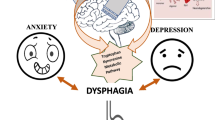Abstract
We aimed to investigate anxiety level of caregivers of neurological patients with dysphagia, and the relationship of patient-related factors to anxiety level of dysphagia caregivers. A total of 103 adult neurological patients with dysphagia (study group), 30 without dysphagia (control group), and their primary caregivers were included. Types of feeding, condition of dependency in eating and drinking, dysphagia duration, and history of previous dysphagia treatment were recorded for study group. In study group, the Turkish version of the Eating Assessment Tool-10 (T-EAT-10) was used to determine dysphagia symptom severity. Penetration and aspiration severity was determined with the penetration–aspiration scale (PAS). The Spielberger State-Trait Anxiety Inventory (STAI) that has two subscales including state anxiety (S-STAI) and trait anxiety (T-STAI) was used to determine anxiety level of caregivers. There was no difference between groups in terms of age, gender, weight, and height. The mean S-STAI was 42.56 ± 10.10 for the study group and 29.20 ± 6.64 for the control group (p < 0.001). The mean T-STAI was 44.81 ± 8.98 for the study group and 29.37 ± 6.46 for the control group (p < 0.001). Significant correlation was detected between only T-STAI and history of previous dysphagia treatment (p = 0.01, r = 0.25). No correlation was found between STAI (in terms of both S-STAI and T-STAI) and T-EAT-10, PAS, types of feeding, condition of dependency in eating and drinking, dysphagia duration (p > 0.05). Caregivers of neurological patients with dysphagia have greater anxiety level than caregivers of neurological patients without dysphagia.
Similar content being viewed by others
References
Eslick GD, Talley NJ. Dysphagia: epidemiology, risk factors and impact on quality of life– a population-based study. Aliment Pharmacol Ther. 2008;27:971–9. doi:10.1111/j.1365-2036.2008.03664.x.
Takizawa C, Gemmell E, Kenworthy J, Speyer R. A systematic review of the prevalence of oropharyngeal dysphagia in stroke, Parkinson’s disease, Alzheimer’s disease, head injury, and pneumonia. Dysphagia. 2009;31:434–41. doi:10.1007/s00455-016-9695-9.
Moraes DP, Andrade CRF. Quality indicators for integrated care of dysphagia in hospital settings. J Soc Bras Fonoaudiol. 2011;23:89–94. doi:10.1590/S2179-64912011000100018.
Chadwick DD, Jolliffe J, Goldbart J. Adherence to eating and drinking guidelines for adults with intellectual disabilities and dysphagia. Am J Ment Retard. 2003;108:202–11.
Hickman J, Jenner L. ALD and dysphagia: issues and practice. Speech Lang Ther Pract. 1997;Autumn:8–11.
Griggs CA, Jones PM, Lee RE. Videofluoroscopic investigation of feeding disorders of children with multiple handicap. Dev Med Child Neurol. 1989;31:303–8. doi:10.1111/j.1469-8749.1989.tb03999.x.
Belafsky PC, Mouadeb DA, Rees CJ, et al. Validity and reliability of the Eating Assessment Tool (EAT-10). Ann Otol Rhinol Laryngol. 2008;117:919–24. doi:10.1177/00348940811701210.
Demir N, Serel Arslan S, İnal Ö, Karaduman AA. Reliability and validity of the Turkish Eating Assessment Tool (T-EAT-10). Dysphagia. 2016;31:644–9. doi:10.1007/s00455-016-9723-9.
Silva-Munhoz Lde F, Bühler KE, Limongi SC. Comparison between clinical and videofluoroscopic evaluation of swallowing in children with suspected dysphagia. Codas. 2015;27:186–92. doi:10.1590/2317-1782/20152014149.
Rosenbek JC, Robbins JA, Roecker EB, Coyle JL, Wood JL. A penetration-aspiration scale. Dysphagia. 1996;11:93–8. doi:10.1007/BF00417897.
Spielberger CD, Gorsuch RL, Lushene R, Vagg PR, Jacobs GA. Manual for the State-Trait Anxiety Inventory. Palo Alto/CA: Consulting Psychologists Press; 1983.
Elliott T, Shewchuk R, Richards JS. Family caregiver problem solving abilities and adjustment during the initial year of the caregiving role. J Couns Psychol. 2001;48:223–32. doi:10.1037/0022-0167.48.2.223.
Drozdz D, Mancopes R, Silva AMT, Reppold C. Analysis of the level of dysphagia, anxiety, and nutritional status before and after speech therapy in patients with stroke. Int Arch Otorhinolaryngol. 2014;18:172–7. doi:10.1055/s-0033-1364169.
Ekberg O, Hamdy S, Woisard V, Wuttge-Hannig A, Ortega P. Social and psychological burden of dysphagia: its impact on diagnosis and treatment. Dysphagia. 2002;17:139–46. doi:10.1007/s00455-001-0113-5.
Chadwick DD, Jolliffe J, Goldbart J. Carer knowledge of dysphagia management strategies. Int J Lang Commun Disord. 2002;37:345–58. doi:10.1080/13682820210137196.
Chadwick DD, Jolliffe J, Goldbart J, Burton MH. Barriers to caregiver compliance with eating and drinking recommendations for adults with intellectual disabilities and dysphagia. J Appl Res Intellect. 2006;19:153–62. doi:10.1111/j.1468-3148.2005.00250.x.
McCullagh E, Brigstocke G, Donaldson N, Kalra L. Determinants of caregiving burden and quality of life in caregivers of stroke patients. Stroke. 2005;36:2181–6. doi:10.1161/01.STR.0000181755.23914.53.
Acknowledgements
We would like to thank the patients and their caregivers who participated and consented to join this study. This study has received no financial support.
Author information
Authors and Affiliations
Corresponding author
Ethics declarations
Conflict of interest
The authors declare that they have no conflict of interest.
Rights and permissions
About this article
Cite this article
Serel Arslan, S., Demir, N. & Karaduman, A.A. The Anxiety Level of Caregivers of Neurological Patients with Dysphagia. Dysphagia 32, 570–574 (2017). https://doi.org/10.1007/s00455-017-9801-7
Received:
Accepted:
Published:
Issue Date:
DOI: https://doi.org/10.1007/s00455-017-9801-7



